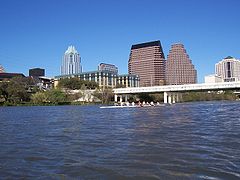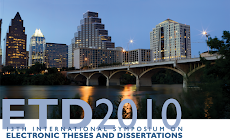Larry Johnson, PhD
The New Media Consortium, Austin, TexasLaurence F. Johnson, Ph.D. is Chief Executive Officer of The
New Media Consortium (NMC), an international not-for-profit consortium dedicated to the exploration and use of new media and new technologies. Its hundreds of member institutions constitute an elite list of the most highly regarded universities, museums, and research centers in the world, as well as some of the world’s most forward-thinking companies. Johnson is an acknowledged expert on emerging technology and its impacts on society and education, and the topics of creativity, innovation, and how to think about the future. With more than 25 years of experience in the higher education arena, he served in campus roles that included faculty dean, CIO, provost, and president before joining the NMC in 2001.
Seven Channels of Change: How Technology is Unfolding, Everywhere We Look
Wednesday, June 16, 2010 - 1:30 pm
Amphitheater 204
After nearly a decade of tracking the evolution of emerging technology as part of the New Media Consortium’s Horizon Project, Larry Johnson, the Horizon Project’s founder and visionary leader, has uncovered seven clear patterns in the evolution of technology that can only be seen over time. From his research, it is clear that these seven powerful channels are at the heart of how learning, work, and play are evolving everywhere in the world and in every sector of education. While the technologies and practices highlighted in the eleven editions of the Horizon Report published over the past decade are being implemented in ways that reflect local constraints and challenges around the globe, the project has been remarkably prescient in its projections.
Virtually all of the technologies highlighted in past Horizon Reports have become commonplace and integrated into everyday activities. All of them continue to unfold, converge and morph, and as they do, they are moving along seven channels, in ways that have greatly influenced almost every form of human activity. What is obvious through the lens of time is that while the currents and eddies of emerging technology are complex, what the Horizon Report have been detailing are developments fueled by these seven profound channels of change.
Join Johnson, the Horizon Project’s founder and visionary leader, as he outlines these seven pathways of innovation and technological evolution that he believes are deeply impacting how we think about our world; the ways we teach, learn, work, and create; and especially how we communicate.
James Crawford, PhDEngineering Director for the Google Books ProjectGoogle Books has the modest goal of scanning the world’s books and making the data searchable online.Prior to joining Google, Dr. Crawford was Executive Vice president at Composite Software, an enterprise software startup in the bay area. During his four years at Composite, his teams delivered next generation data integration technology to some of the world’s largest financial institutions, manufacturers, and multiple government agencies.Before joining Composite Software, Dr. Crawford spent three years at NASA’s Ames Research Center as lead for autonomy and robotics. Among many other projects, one of his teams delivered the optimized activity planner used by both the Opportunity and Spirit Mars rovers.
Prior to joining NASA, Dr. Crawford was the optimization architect for the i2 Technologies supply chain planner, co-founded the Computational Intelligence Research Laboratory (CIRL) at the University of Oregon, and worked at AT&T Bell Laboratories (back when the creators of Unix were still in residence).Dr. Crawford has authored over 15 papers in referred journals and conferences, and holds five patents. He received his PhD from the University of Texas at Austin in Artificial Intelligence and his B.A. in Mathematics and Computer Science from Rice University.
The Present & Future of Google Books
Thursday, June 17, 2010 - 1:30 pm
Amphitheater 204
The Google Books project has the modest goal of scanning all of the world’s books, converting them to digital form, and making them searchable as easily as web pages. To date over twelve million books containing over four billion pages have been scanned and digitized. The challenges have been one part technical, including OCR for dozens of languages, and one part legal (copyright laws were inherited from a different age). As the corpus emerges, and the legal challenges are overcome, books are becoming more accessible than ever before and new opportunities are arising in areas ranging from social collaboration to linguistic analysis.








 The USETDA would like your input. Please visit
The USETDA would like your input. Please visit 











